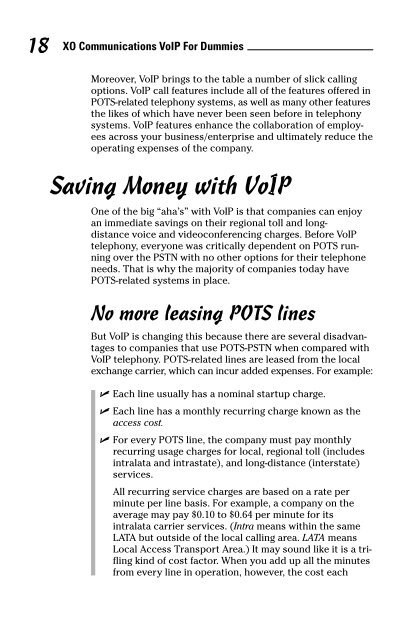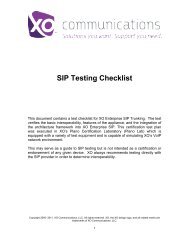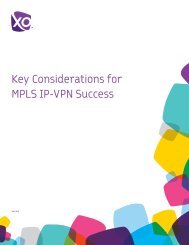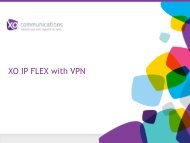VoIP for Dummies Book - XO Communications
VoIP for Dummies Book - XO Communications
VoIP for Dummies Book - XO Communications
Create successful ePaper yourself
Turn your PDF publications into a flip-book with our unique Google optimized e-Paper software.
18<br />
<strong>XO</strong> <strong>Communications</strong> <strong>VoIP</strong> For <strong>Dummies</strong><br />
Moreover, <strong>VoIP</strong> brings to the table a number of slick calling<br />
options. <strong>VoIP</strong> call features include all of the features offered in<br />
POTS-related telephony systems, as well as many other features<br />
the likes of which have never been seen be<strong>for</strong>e in telephony<br />
systems. <strong>VoIP</strong> features enhance the collaboration of employees<br />
across your business/enterprise and ultimately reduce the<br />
operating expenses of the company.<br />
Saving Money with <strong>VoIP</strong><br />
One of the big “aha’s” with <strong>VoIP</strong> is that companies can enjoy<br />
an immediate savings on their regional toll and longdistance<br />
voice and videoconferencing charges. Be<strong>for</strong>e <strong>VoIP</strong><br />
telephony, everyone was critically dependent on POTS running<br />
over the PSTN with no other options <strong>for</strong> their telephone<br />
needs. That is why the majority of companies today have<br />
POTS-related systems in place.<br />
No more leasing POTS lines<br />
But <strong>VoIP</strong> is changing this because there are several disadvantages<br />
to companies that use POTS-PSTN when compared with<br />
<strong>VoIP</strong> telephony. POTS-related lines are leased from the local<br />
exchange carrier, which can incur added expenses. For example:<br />
� Each line usually has a nominal startup charge.<br />
� Each line has a monthly recurring charge known as the<br />
access cost.<br />
� For every POTS line, the company must pay monthly<br />
recurring usage charges <strong>for</strong> local, regional toll (includes<br />
intralata and intrastate), and long-distance (interstate)<br />
services.<br />
All recurring service charges are based on a rate per<br />
minute per line basis. For example, a company on the<br />
average may pay $0.10 to $0.64 per minute <strong>for</strong> its<br />
intralata carrier services. (Intra means within the same<br />
LATA but outside of the local calling area. LATA means<br />
Local Access Transport Area.) It may sound like it is a trifling<br />
kind of cost factor. When you add up all the minutes<br />
from every line in operation, however, the cost each






